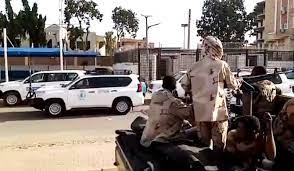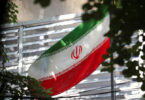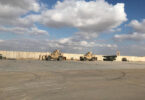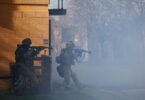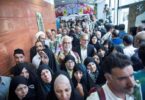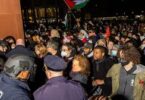CAIRO (AFP): When a power struggle between Sudan’s top generals erupted into bloodshed, battle-hardened commanders unleashed every weapon in their arsenal — fighter jets, tanks and also social media.
Army chief Abdel Fattah Al-Burhan and his deputy-turned-rival Mohamed Hamdan Dagalo have been “flooding the media with false information,” said Raghdan Orsud of Beam Reports, which investigates disinformation in Sudan.
For 5 million people in Sudan’s capital — trapped inside their homes as street fighting has raged, including around the state TV headquarters — Twitter and Facebook quickly became key sources of information.
Both rival forces have since issued “twisted facts” in online media campaigns aimed at deepening the “state of fear,” said Mohamed Suliman, disinformation researcher at Boston’s Northeastern University.
The fighting has seen the paramilitary Rapid Support Forces — a force tens of thousands strong, formed from the Janjaweed militia that led years of extreme violence in the Darfur region — take on the regular army.
While neither side has seemingly seized the advantage so far, in the war of words the paramilitaries are “outpacing” the army’s “old tactics,” Suliman said.
Both sides have a history of using social media to push their message in their battles for control.
Al-Burhan and Dagalo are former allies who seized power in a 2021 coup but later fell out in a bitter power struggle, which erupted into open conflict on April 15.
Dagalo — commonly known as Hemedti — is a former camel trader and militia commander accused of leading forces that have committed multiple atrocities.
Recently he has sought to portray himself as a statesman.
Two days into the fighting, some social media users were taken aback when Dagalo began to release posts in polished English arguing the RSF were battling “radical Islamists” who are “waging a brutal campaign against innocent people.”
Many saw proof in those messages that the RSF is “benefiting from expert service and assistance in terms of its online image and messaging,” a specialist on the region said.
Experts from the Atlantic Council’s Digital Forensic Research Lab recorded an increase in the RSF’s long-running disinformation campaign since December 2022.
DFRLab tracked two networks — one with “at least 900 potentially hijacked Twitter accounts” — that were “artificially amplifying” the popularity of RSF posts.
Before fighting started, they “portrayed Hemedti as a reformist general who supports the move toward democracy, a competent leader of a powerful paramilitary force and a viable future leader for Sudan,” DFRLab’s Tessa Knight wrote. When fighting began, their tone shifted to brand Dagalo as a “hero fighting to protect Sudan and cleanse the country of traitors.”
Al-Burhan and the army have also sought to win the information battle, but have been using
more “traditional” propaganda, Orsud said.
Fact-checkers have recorded a flurry of misleading posts praising the army using old footage, including from conflicts in Yemen and Libya and — in at least one instance — a video game.
Other fake videos purported to show wads of cash being seized at Dagalo’s home.
Adding to the information confusion, on Thursday, Twitter stripped accounts of free blue verification ticks, including from Al-Burhan’s official account.
With the check marks now available for cash, at least one account falsely purporting to be the RSF bought a blue tick and lied that Dagalo had died. The RSF’s account also bought a blue tick, while Dagalo’s retained a grey checkmark, signifying that he is a government official.
Social media warfare is nothing new for the RSF.
Beam Reports tracked “a systematic campaign to polish the paramilitaries’ image” on Facebook that began in May 2019, after the army’s ouster of dictator Omar Bashir.
Between 2019 and 2021, Facebook shut down over a thousand Facebook and Instagram accounts linked to the RSF for “coordinated inauthentic behavior,” including hundreds just a month before Al-Burhan and Dagalo led
their coup.
Seeking a rebrand from militia commander to statesman, Dagalo has previously employed outside help, including a $6 million deal in May 2019 with a Canadian lobbying firm to engage with leaders including in the US and Russia.
The following month, in June 2019, RSF gunmen were accused of crushing pro-democracy protests in Khartoum in which 128 people were killed.

